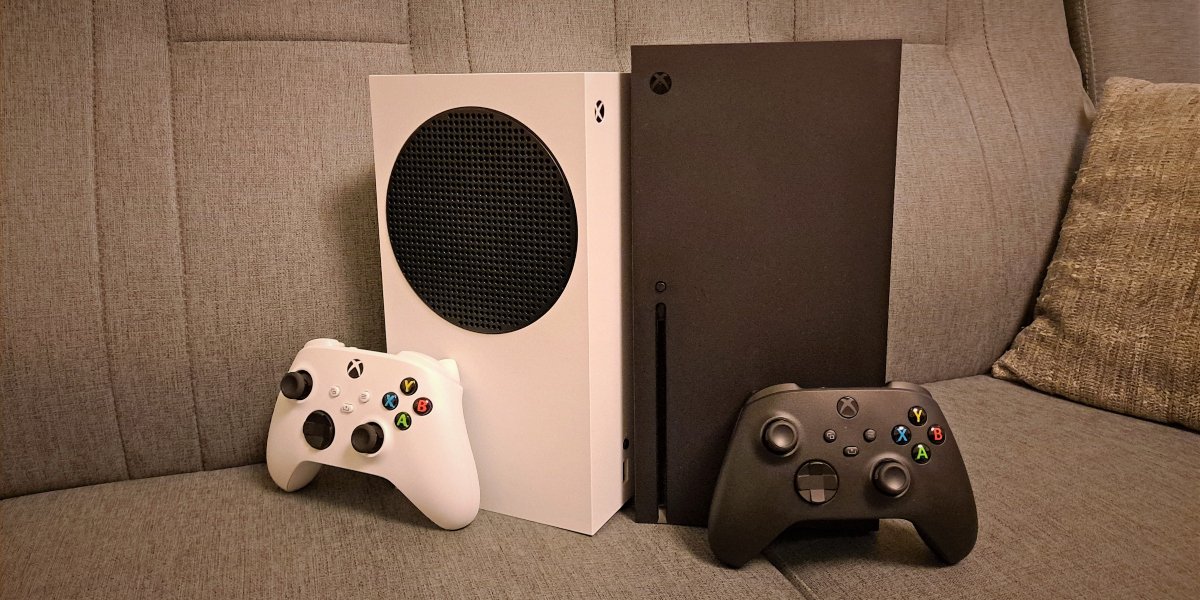Projector
Digital Display
Job References
Search Clear

We’ve recently spent a lot of time running games on the Xbox Series X and Xbox Series S side by side, with a focus on The Ascent. As of mid-summer 2021, The Ascent isn’t just one of the most popular games of the season, it’s also an excellent showcase for “next gen gaming” and thus a good way to gauge performance and monitor suitability.
Our conclusion is simple. If you’re primarily a PC gamer keen on high refresh rate and response rather than sheer pixel count, and later develop a hankering for some console gaming on the side, then a 1080p 165Hz gaming monitor and an Xbox Series S would be an excellent combo. Allow us to explain.
The Xbox Series S is kind of like Microsoft’s Switch. Especially with easy game casting from the console to Android and iOS devices with remote play. The Series S is super compact and stylish, yet packs considerable power. Certainly, the Xbox Series X is at least three times as powerful, and in raw graphics processing even the previous gen Xbox One X is one third more powerful than the Series S. But that’s not the point, as the Series S is quite affordable and presented in a marvel of industrial design. And it’s perfectly capable of 1080p and 1440p in 120Hz, which isn’t half bad.
So again, if you’re a PC gamer that focuses on competitive play, high refresh, and low latency, then the Series S is a good companion when you feel like something different. A good 165Hz gaming monitor with 1ms MPRT will work superbly with the Series S via HDMI. The console will have no problem running at a native 1080p 120Hz. Additionally, there’s talk of unlocked framerates for Series S titles as developers become more familiar with the platform. There’s no real reason why 120Hz should be a hard stop for frame rates on the Series S. A quick back of a napkin calculation tells us that the Series S with its 4TFLOPS of GPU power and 8GB of game-ready memory can easily go beyond 120Hz to reach 144Hz or maybe even 165Hz, at least in not so demanding titles. There’s absolutely no reason something like Rainbow Six Siege couldn’t run at 165Hz on the Series S seeing as far less capable PCs get it going into 200-plus FPS territory.
This is a 4K 60Hz machine through and through. Impressive for sure, but not geared towards high refresh rate. Some titles manage 120Hz but in lower resolutions and with reduced settings. The Series X is also an amazing machine, but for a desktop-based study environment it’s not a good fit. For your living room 4K TV or gaming projector, definitely. The Xbox Series X showcases games in a very stable formula, that of 4K 60Hz in high or ultra settings. It’s nigh indistinguishable from PC versions of games other than the PC offering unlocked frames, if you have a powerful enough GPU. We’re very doubtful the Series X will go beyond 120Hz, as that would mean diverting the focus to lower resolutions. Sure, with 12TFLOPS of GPU power the Series X can effortlessly do 165Hz or more in 1080p and 1440p, but that’s not something Microsoft appears interested in.
The bottom line is that if you prefer 1080p high refresh rate to 4K 60Hz, then the Series S is the console you want. Both Series X and PS5 are very firmly 4K 60Hz HDR ultra setting devices and do not prioritize going beyond 60Hz, as the prime directive for both is to avoid sacrificing resolution and visual quality. The Series S is free from those constraints, and has no problem letting loose in 900p 165Hz if developers allow it to do so.
The Ascent shows that what we said above holds true in the real world. We played this game on Steam, Xbox Series X, and Xbox Series S. Steam PC and Series X look amazing in glorious 4K ultra settings, though on PC we achieved 120Hz easily with an RTX 3090, while the Series X is locked to 60Hz. On Series X resolution seems to vary between 1440p and 2160p, but usually remains very close to full 4K.
On Series S, The Ascent appears to operate in a dynamic resolution range of 900p to 1440p while locked to 60Hz. We believe for the most part, 1080p is the main resolution the game’s running with on the Series S in 60Hz. Future updates could bump this up to 120Hz, hopefully. In any case, The Ascent looks wonderful on a 25” or 27” 165Hz gaming monitor with an IPS panel allowing all of those colors to come through beautifully. While the Series S depicts games in a way that may be a bit fuzzy on larger screens and projections, for a normal sized gaming monitor it’s perfect.
Don’t forget that Series S retains most of the premium aspects of its bigger sister the Series X. For PC gaming monitors the most important of these is VESA Adaptive Sync, or just variable refresh rate. The Series S is therefore compatible with any gaming monitor with FreeSync. So even if your monitor is a native 165Hz panel and the Series S runs games at 60Hz, you’re covered by the FreeSync range and will not experience any screen tearing.
While spending time with the Series S we were reminded of playing DOOM 2016 and Skyrim on Nintendo Switch. You get that wow vibe from playing what you know to be impressive games on systems that by simple appearances alone seem to be somewhat modest in terms of hardware capabilities. We suspect the same warm, cozy feeling will accompany playing on the upcoming Steam Deck. When hardware defies expectations, it’s very rewarding for gamers, and the Xbox Series S definitely belongs in Camp Expectation Defiance.